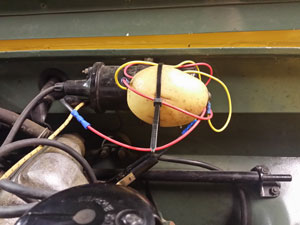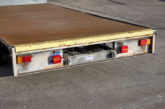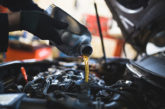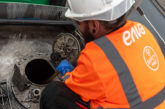
An AA patrol has received a prize for fixing a car with a potato. The humble root vegetable came to the rescue when an old 1960s-vintage Land Rover on a farm in Hertfordshire failed to start due to a broken condenser, which is part of the ignition system on older vehicles.
With no replacement part available, north-east London AA patrol Mario Papademetriou, 59, decided to fabricate one. Unfortunately, his first attempt using tin foil and silicone repair tape didn’t work so he was faced with a non-starting Land Rover and 12 miles to the nearest garage.
 Mario Papademetriou: “As the vehicle was on a farm, there were a lot of vegetables around, so I thought I’d try wiring up a potato with a couple of screws to act as a condenser.
Mario Papademetriou: “As the vehicle was on a farm, there were a lot of vegetables around, so I thought I’d try wiring up a potato with a couple of screws to act as a condenser.
“Amazingly, it started instantly, so I followed the member to the garage and he said the vehicle had never driven so well!”
Mario won an internal AA competition to find the most original and inventive roadside repair among its patrols.
Donald MacSporran, AA Technical Director, says: “AA patrols work on pretty much any vehicle on the road and pride themselves on their ability to fix them. While they regularly go the extra mile with some very inventive repairs, we continue to invest in their training and equipment – including the latest Bosch vehicle diagnostics – to maintain our leading fix rate.
“Although vegetables are best left on the dinner plate, Mario’s use of a potato was definitely a chip above the others – an excellent example of thinking outside the box.”
The potato isn’t the only foodstuff that has been used to fix or run a car. In the old days, a raw egg could sometimes be cracked into a car’s radiator to seal a leak; chewing gum can temporarily fix a windscreen seal; and baking soda and warm water can clean battery terminals.
Petrol and diesel can both contain a proportion of biofuel – bioethanol produced from crops such as wheat and corn; and biodiesel from a range of feed stocks, including oil seed rape and waste cooking oil.
Even cars themselves are increasingly being made with often food-based biodegradable plastics, leading to a rise in breakdowns caused by rodents gnawing through wiring and other components.









